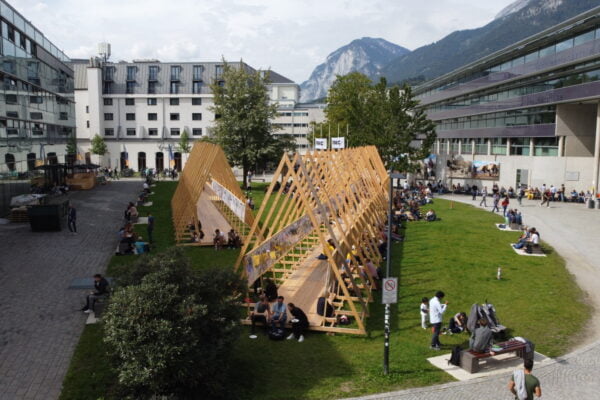
NAME:
SOWI - Garden
BUILDING:
SOWI
FLOOR:
0
TYPE:
Garden
CAPACITY:
2000
ACCESS:
Public Access
EQUIPMENT:
---
In mountain environments, the occurrence of springs, stream networks and other water bodies dependent on groundwater are influenced by several factors, including climate, topography, and the distribution of hydraulic properties. In crystalline media, this distribution is closely related to lithology and the presence of fractures, which play a critical role in directing groundwater flow. In addition, tectonic and topographic stresses can significantly alter these hydraulic properties by exerting compressive and extensional forces on the rock mass and fractures. Prior to the development of high tectonic stresses, mirror geometries are expected to form where the valley floor experiences compression, resulting in lower permeability, while the ridge experiences extension, resulting in higher permeability.
While the architecture of the critical zone and its relationship to tectonic stress and hydrogeologic properties has been studied, there is still a lack of comprehensive quantitative analysis focusing on groundwater flow. While it has been demonstrated that variations in critical zone architecture can influence groundwater storage and discharge, a comprehensive evaluation of the specific tectonic and topographic conditions at the basin scale under which these effects become significant remains to be conducted.
The objective of this study is to examine the impact of stress on the hydraulic characteristics of bedrock and its effect on groundwater flow. To this end, a geomechanical model was implemented, followed by a groundwater flow model, at the UNINE Poschiavino Observatory for Alpine Groundwater Research. The results of the geomechanical model are then converted and utilized as input parameters for the flow model. To assess the impact of tectonic stress, a sensitivity analysis was conducted, comparing different geomechanical configurations and flow models with homogeneous hydraulic properties. The results of this study demonstrate the influence of tectonic stress on hydrogeological observations, including the discharge of groundwater in seepage zones.

We and use cookies and other tracking technologies to improve your experience on our website. We may store and/or access information on a device and process personal data, such as your IP address and browsing data, for personalised advertising and content, advertising and content measurement, audience research and services development. Additionally, we may utilize precise geolocation data and identification through device scanning.
Please note that your consent will be valid across all our subdomains. You can change or withdraw your consent at any time by clicking the “Consent Preferences” button at the bottom of your screen. We respect your choices and are committed to providing you with a transparent and secure browsing experience.